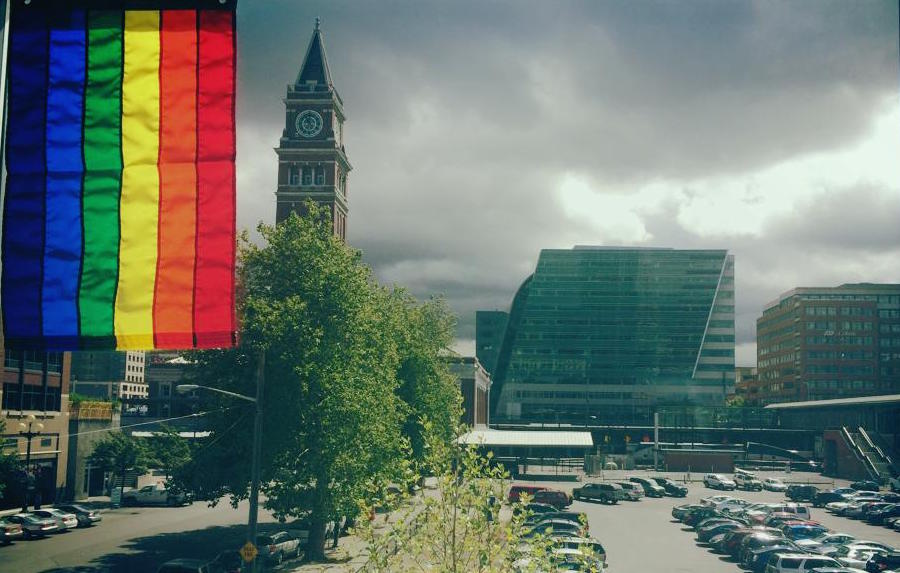June was a complicated month for queer and trans communities in Seattle. On Pride Sunday, a crowd nearing the population of Seattle gathered Downtown to celebrate the annual Pride parade and festival—one of the largest in the country. Known for its flamboyance and grandiosity, Pride is a hallmark event for queer and trans communities across the globe. But this year was marked by a somber air. Just two weeks prior, one of the worst mass shootings in modern American history took place inside Pulse, a gay nightclub in Orlando, Florida. And two days prior, while leaving a fundraiser for the tragedy on Capitol Hill, Michael Vol, a transgender person, was violently attacked in a hate crime. The attacker greeted them with “Happy Pride,” and proceeded to assault them while using transphobic slurs.
These attacks are neither new nor isolated. Indeed, hate crimes against LGBT people doubled between 2014 and 2015, with 72 reported. By one analysis, LGBT and black communities are twice as likely to be targeted for hate crimes than other groups.
Massacres like Orlando do not stand alone in history either. In 1973, 32 people were burned alive in the UpStairs Lounge arson attack. It was the deadliest anti-gay attack until Orlando. Here at home, an arsonist attempted to set fire to Neighbors nightclub on Capitol Hill just last year.
We at The Urbanist advocate for livable and thriving urban communities, most often through wonky local land-use, housing, and transportation policy. Our time is spent advocating for road rechannelization, queue jumps, and woonerven—issues that rarely make headlines. But we understand that good cities are more than that.
If cities are human habitat, then it is vital that we understand them as more than physical infrastructure—the concrete bones and metal veins. It takes more than train tracks, sewers, and highrises for humans to thrive. It takes intangible elements—feelings of community, safety, and affirmation. A woonerf is meaningless to queer couples if they don’t feel safe holding hands walking through it. The minutes saved by a dedicated bus lane go uncounted by a trans rider fending off transphobic epithets.
For cities to thrive, their communities must thrive too.
Luckily, queer and trans communities share something fundamental in common with cities: resilience. Our community has always risen taller and stronger in the face of adversity. When gay bars (our community centers and safe places) were raided by police, we fought back. When gay men’s bodies were ravaged by HIV/AIDS, we fought back. When our neighbors denied us the right to serve our country and marry the person we love, we fought back. When we fight, we win.
Cities have played in a key role in our organization and community building. While imperfect, they have acted as safe havens for queer people to find each other and accept themselves. They have done so by providing one crucial advantage: numbers.
We face two main obstacles when building communities: we are few and we are (often) invisible. We are also born dispersed from each other—queer parents are not more likely to have queer kids. So we must find each other.
Cities offer the critical mass for queer people to create queer spaces—bars, clubs, community centers, and even entire neighborhoods. These spaces are the birth places of queer culture, friendships, and relationships. People with shared understandings and experiences. We can walk down the street and assume the people we pass are queer like us.
As these spaces grow, sub-communities begin to form. Clubs are born for gay gamers (i.e., gaymers), lesbian rugby teams, trans knitting clubs, dance groups, running groups, hiking groups, prayer groups, comic book stores.
People shunned from their families of origin begin to build families of choice.
We build neighborhoods that host drag shows and pride picnics, storefronts adorned with rainbow flags as far as the eye can see, crosswalks with rainbow stripes. We move beyond places that merely tolerate or accept us and into neighborhoods that celebrate us.
My reasons for being an urbanist are many. I have always loved transit. The social and employment opportunities are bountiful. I can walk to work and pick up dinner on the way back. But perhaps most importantly, cities are where I find my tribe.

Ben Crowther
Ben is a Seattle area native, living with his husband downtown since 2013. He started in queer grassroots organizing in 2009 and quickly developed a love for all things political and wonky. When he’s not reading news articles, he can be found excitedly pointing out new buses or prime plots for redevelopment to his uninterested friends who really just want to get to dinner. Ben served as The Urbanist's Policy and Legislative Affairs Director from 2015 to 2018 and primarily writes about political issues.

